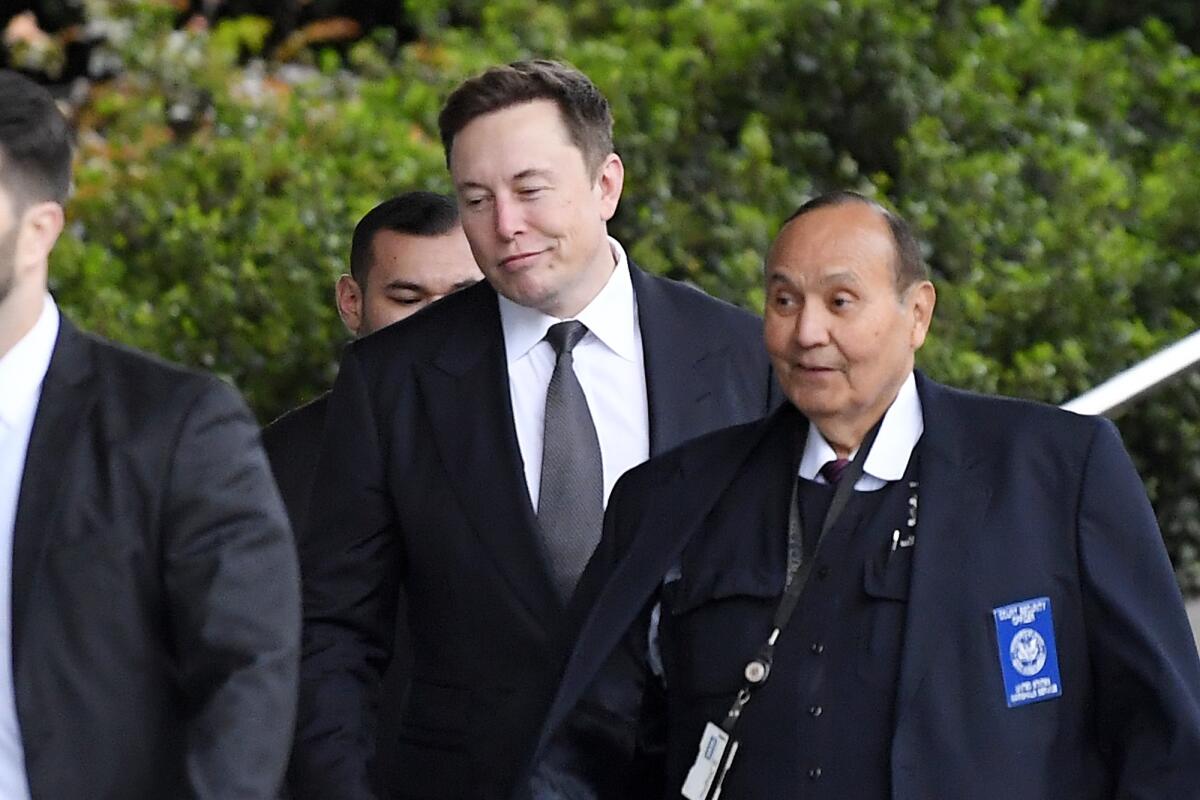Elon Musk tells ‘pedo guy’ jury he’s worth $20 billion but is low on cash

- Share via
Elon Musk says he doesn’t have a lot of cash.
Musk’s wealth came up in the second day of his testimony before a federal jury in Los Angeles where the Tesla Inc. and SpaceX chief executive is on trial over a tweet in which he referred to a British cave expert as a “pedo guy.”
After an unsuccessful objection from his lawyer, Musk told the jury that he has Tesla stock and SpaceX stock, with debt against those holdings, and that his net worth is about $20 billion. But contrary to public opinion, he said, he didn’t have much cash. Musk finished testifying after a total of about six hours on the stand over two days.
Caver Vernon Unsworth sued Musk over the “pedo guy” tweet, which the CEO called “a flippant, off-the-cuff insult.” Musk said he was responding to Unsworth’s criticism of Musk’s effort to help rescue members of a Thai youth soccer team from a flooded cave in 2018. Musk and engineers at his companies prepared a mini submarine to help with the rescue efforts. The 12 children, ages 11 to 16, and their coach were ultimately saved without the sub.
Unsworth, who knew the caves well, ridiculed Musk’s high-profile effort. He told CNN that Musk could “stick his submarine where it hurts” and called the idea a PR stunt with no chance of working.
That angered Musk, who said a team of engineers worked very hard to build the sub to save the boys. He said Unsworth’s comments denigrated the efforts of his team.
Thai rescue officials were “very happy” with his team’s effort and the government thanked him for it, Musk said, contradicting Unsworth’s comments in the CNN interview.
Musk also explained to the jury his penchant to tweet. (He also retweeted a Tesla post during a break in his testimony.)
The CEO said he likes to solicit public input on Twitter. “There are pretty smart people out there,” he said.
Despite Musk’s status as one of the richest people on the planet, his net worth is largely illiquid.
The Bloomberg Billionaires Index puts his fortune at $26.6 billion. That includes an estimated $14.6-billion stake in SpaceX. Musk has said that he doesn’t intend to sell any of his holdings in the closely held company.
Musk has also long been a buyer of Tesla shares to bolster his $11.4-billion holding.
He has pledged about 40% of his Tesla shares to unlock some of the wealth without shrinking his stake. A May filing revealed that he had access to about $500 million of credit lines from affiliates of Morgan Stanley, Goldman Sachs and Bank of America as of April 30. Still, that’s a fraction of his overall fortune, and it’s unclear how much of those credit lines remain unused.
Musk’s wealth is an issue at the trial because a jury may consider evidence of his net worth in determining punitive damages. But Musk’s lawyers argued in court papers that the jury can’t award more in punitive damages than in compensatory damages. There is no way the jury would award more than $1 billion in compensation, so Musk’s net worth exceeding that isn’t relevant, the lawyers said.
In his testimony, Musk suggested some advice for Unsworth to hear: “As my mom said, if somebody insults you, just let it go.”
In September, Musk revealed in court documents that one of his trusted aides, Jared Birchall, paid $50,000 to hire a private investigator who looked into Unsworth. Attorneys for Unsworth said the investigator was offered a $10,000 bonus if he was able to confirm nefarious behavior — which was never paid.
Birchall worked at Morgan Stanley until 2016 and is the manager of Excession, Musk’s family office.
He took the stand after Musk.
Birchall testified that he hired James Howard, who he said turned out to be a con man.
After Howard came up with what later turned out to be fake dirt on Unsworth, such as that he had been visiting Thailand since the 1980s and that he met his wife when she was a teenager, Birchall — using the name James Brickhouse — told Howard to leak the information to media in Britain.
“I believed him to be a credible investigator,” Birchall told the jury. “I understood these things to be facts. I asked him to share facts.”
Musk also enlisted help from a second investigator at the Palo Alto law firm Cooley. Cooley didn’t respond to a request for comment.
Hull, Pettersson and Metcalf write for Bloomberg.
More to Read
Inside the business of entertainment
The Wide Shot brings you news, analysis and insights on everything from streaming wars to production — and what it all means for the future.
You may occasionally receive promotional content from the Los Angeles Times.










